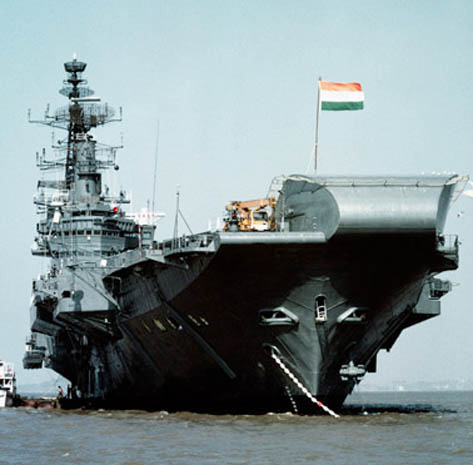The Government also named Coast Guard (CG) chief as the head of the newly set up Coastal Command. Apart from designating the Naval commanders as Coastal Defence Commanders, the government would also provide the Navy with a 1,000-men 'Sagar Prahari Bal' for securing its installations and create a new north-western region for the CG in Gujarat.
It will also increase the number of ships, aircraft, helicopters, bases and manpower for both the Navy and the CG.
Announcing the decision in Kochi on the sidelines of India's first indigenous aircraft carrier keel laying ceremony, Defence Minister A K Antony said the 26/11 attacks had "shaken" the country and highlighted the need for strengthening the maritime security set up to safeguard the nation against threats from the sea.
"The government has approved certain important measures for strengthening maritime and coastal security against threats from the sea," he told reporters.
"Against the backdrop of multiple agencies involved in coastal security and resultant problems of coordination, the government has decided to designate the Navy as the authority responsible for overall maritime security, which includes coastal security and offshore security," Antony said.
The Navy, he said, would be assisted by Coast Guard, State Marine Police and other central and state agencies for the coastal defence of the nation.
"The Coast Guard is additionally designated as the authority responsible for coastal security in territorial waters including areas to be patrolled by the coastal police. The CG Director General will be designated as the Commander of Coastal Command," Antony said.
"The CG Director General will be responsible for overall coordination between central and state agencies in all matters relating to coastal security," he said.
For the smooth functioning of this arrangement and to prevent rogue ships going unidentified with each agency shifting the responsibility on the other, the government would set up four Joint Operations Centres (JOCs).
The JOCs would be established at Mumbai, Visakhapatnam, Kochi and Port Blair and these centres would be under the command of the existing Naval Commanders-in-Chiefs (C-in-Cs) respectively and they would be designated as the C-in-Cs of Coastal Defence.
"The JOCs will be jointly manned and operated by the Navy and CG with inputs from diverse agencies including central and state agencies," Antony said.
The government would also establish a national Command, Control, Communication and Intelligence (3CI) network for real-time maritime domain awareness linking the operations rooms of the Navy and the CG, both at the field and apex levels.
However, the Navy would control all its joint operations and those by the CG to ensure that the assets were optimally deployed and there was synergy between the two organisations.
"With these measures, the government is expecting that a new focus will be given for effectively managing threats from the sea and security for the over 7,500-km coastline," Antony said.
By establishing the new, specialised 'Sagar Prahari Bal', the government hopes for protecting naval assets and bases on both east and west coasts and island territories.
The Navy would also get 80 new Fast Interception Crafts for seafront patrolling by the Bal. The setting up of a new north-west region for the CG with responsibility to secure the Gujarat coast, sharing martime borders with Pakistan, would necessitate the creation of a new post of CG Commander for the region to look after the surveillance of the State's coast, the Defence Minister said.
With offshore security being an important component of maritime security, the government also decided to install Vessel and Air Traffic Management System for all offshore development areas, as has been done in the Western region by Petroleum Ministry.
"Along with this, the government would procure Immediate Support Vessels for offshore security by both the Petroleum Ministry and the Navy. In the interim, patrolling using hired crafts will be done," Antony said.
To strengthen the CG, the government would also set up nine additional Coast Guard stations to integrate into the 'hub and spoke concept' with coastal police stations along with manpower.
"These stations are to be located at Karwar, Ratnagiri, Vadinar, Gopalpur, Minicoy, Androth, Karaikal, Hut Bay and Nizampatnam," the Defence Minister said.
The Coast Guard would be empowered both in terms of providing assets and necessary manpower for their enhanced role in guarding the coastline. New posts of Additional Director General and three Deputy DGs were sanctioned, in addition to 20 per cent increase in ships and 30 per cent increase for shore support, Antony said.
To improve the intelligence set-up of Coast Guard, adequate manpower resources would also be given.
Antony said a new static coastal radar chain and a comprehensive network of AIS stations along the entire coastline, including islands, would be set up.
"This will be implemented by the shipping, road transport and highway ministry in coordination with Coast Guard. Further, AIS transponders on vessels below 300 tonnes are also proposed to be installed.
This work will be done by the shipping ministry in coordination with Coast Guard," Antony said. "These measures approved by the government are expected to give a new thrust for strengthening coastal security and meet the challenges of threats from the sea," he said.
Asked if the government would henceforth provide the Navy, the smallest of the three armed forces, its due, Antony said: "In the future, we have to give more support to the Navy. We have to be more careful in the seas, as 90 per cent of India's international trade is carried out through the sea route."
